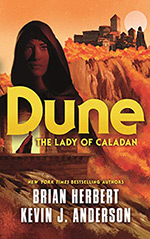
![]() thegooddoctor
thegooddoctor
12/30/2021
![]()
My rating system: I begin with one star being equivalent to a rating of "C -". Progressing upwards, I add ½ star for each step, up to the maximum 5 stars, which is equivalent to a rating of "A"+. I reserve ½ star for BOMBS, there being no option of zero or negative stars. Even though I rated this novel "C", that only translates to 1 ½ stars in my system.
Most people on Worlds Without End never ever rate anything lower than 2 /12 stars - thus they squander half of potential space in the ratings system. Then they are left with little space to distinguish between mundane, ordinary, everyday novels and those that are truly extraordinary. Furthermore, they neglect to give visitors to the site - the potential readers of the novels they are rating - any hint whatsoever that some of these novels are not really worth their time. I do not rate novels ½ star to be unkind - I do so to caution readers wandering through the vast minefield that is SF & F.
My Review
If you are mistakenly looking here for the books that inspired new movie - you have definitely come to the WRONG place. The novel you are seeking is "Dune", a masterwork by Frank Herbert. The novel is truly amazing, and the first 2 sequels - Dune Messiah and Children of Dune - continue the narrative at a level that is only slightly diminished.
After you read the original novel Dune, and perhaps the first 2 sequels listed above, you will have to ask yourself whether it is worth taking the risk that later sequels, most especially sequels by another hand entirely, will diminish your appreciation of the original work. If you enjoyed the original "Alien", and the even better "Aliens", is it sensible to expect that endless pale imitations by other cinematographers will be worth viewing?
Obviously, since I am writing this review, I did decide to take the chance, and I do continue to read these many "sequels by another hand" (or two sets of hands). As long as you have toned down your expectations, the books in this series are mostly okay. Yes, there is considerable repetition - poor Paul (and the readers) have been reminded endlessly of the wise sayings of Thufir Hawat, we have been told countless times of the Sappho juice that stains the lips of mentats, we know how noble Duke Leto is, and how incredibly bloodthirsty and evil those Harkonnens are. This novel, as well as the immediately preceding installment - The Duke of Caladan - are reasonable, workmanlike additions to the latter series (up to about 15 or so by now). Nothing terrible, nothing great, mostly just more of the same.
All of which proves, once again, that the remarkable Frank Herbert was no better at posthumous collaborations than anyone else. And no, sadly, there is no evidence whatsoever that his son Brian inherited his prodigious writing talent.